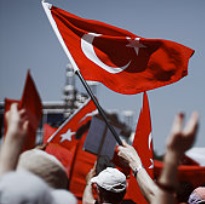- About
- Topics
- Picks
- Audio
- Story
- In-Depth
- Opinion
- News
- Donate
- Signup for our newsletterOur Editors' Best Picks.Send
Read, Debate: Engage.
| topic: | Democracy |
|---|---|
| located: | Turkey, Russia, China, Bosnia and Herzegovina, Albania, Serbia, Kosovo, Montenegro |
| editor: | Katarina Panić |
Failing to reach the European Union membership, many Balkan countries devastated by wars, corruption, lack of democracy and a poor economy are forced to seek allies elsewhere. The offer is very diverse: Turkey, Russia, China, the USA, NATO, and Islamic states. The Balkans are interested in investments and diplomatic support. All the other countries are seemingly interested in geostrategic, long-term dominance and trading in influence.
Unlike Russia with its anti-NATO and anti-EU stands, Turkey was the one who has been campaigning both for a very long time. Because of Russia, apparently, things have changed a bit. It seems that new friendships that have arisen over the war in Syria also affected the Balkans.
“Turkey will continue to support Bosnia and Herzegovina’s commitment to Europe”, Cevdet Yilmaz vice-chairman of AK Party said during his last month’s visit to Sarajevo. This was the very first time one Turkish official did not mention NATO along with the EU. The obvious turnover in Turkish foreign policy is exactly in the line with Russian interests: distance from the EU, NATO and the USA as well as their common hostility to the West.
In terms of economy, Turkish companies invested more than three billion US dollars in Bosnia and Herzegovina, Serbia, Kosovo, Albania, Monte Negro, and North Macedonia so far. In terms of diplomacy, Turkey is about to use all the benefits of the communist heritage. So, how far will the servility towards former invaders go?
It goes just as far that Balkans leaders, prone to glorifying dictators, disobey the court decisions which protect Turkish citizens, most of them asylum-seekers after a failed 2016 coup d’état. Turkish President Recep Tayyip Erdogan repeatedly request the extradition of people listed as Gulenists.
“Turkey has certain demands and this matter was not raised this time, this was discussed when we were in Ankara too,” Bosnia Presidency Chairman Milorad Dodik confirmed in July after Erdogan had visited Sarajevo. Two months later Bosnia’s authorities cancelled residence permits for a group of Turks. Kosovo and Serbia also did the same outside of any legal extradition process. In Monte Negro a court case is still ongoing.
Finally, the US recognised a high level of both Turkish and Russian threats in the region. In the last two months it appointed experienced career diplomat Matthew Palmer as the new US Special Representative to the Western Balkans and its top diplomatic representative in Germany Richard Grenell as new special envoy for the Serbia-Kosovo talks in order to re-establish the White House role as the main constructive player in the region.
